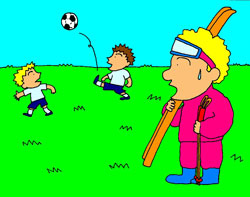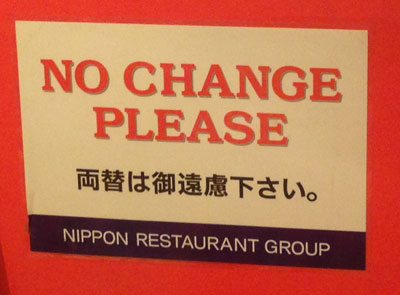この文章を英語にしてください。(辞書を使ってはいけません!)
さっき、銀座通り通った。そこはもう込んでいる。
次のクイズは1月14日(水)です。
This site will always respect your personal information.
Entering your e-mail address will allow this form to send a copy of your answer back to you.
このコーナーは毎週水曜日です!
さぁ、変な英語を直しましょう!-
さっき、銀座通り通った。そこはもう込んでいる。
次のクイズは1月14日(水)です。
This site will always respect your personal information.
Entering your e-mail address will allow this form to send a copy of your answer back to you.
このコーナーは毎週水曜日です!

ポッドキャスト: 新しいウインドウで再生 | ダウンロード
Subscribe: RSS

X No Change Please
Tim says:
This sign was intended to mean that you can not receive change from this cashier. But it sounds as if the restaurant does not want to receive change from you!
The Japanese translation uses the term 両替. We can assume that the intended meaning is お金をくずす (“make change”) and not, for example, changing yen to dollars.
But “change” is being used as a noun here (rather than the verb “make change” or “give change”), and as a noun it should mean 「小銭」, or 「おつり」, or even 「変革」! So “No change please” translates as「小銭を私たちに与えないでください」! (Native speakers will NOT think that “No change please” means “Please don’t ask us to make change.”)
Technically, 「両替は御遠慮下さい」 means “Please refrain from asking us to make change”, which is a natural way of expressing this in Japanese, but sounds strange in English. We expect a sign like this to tell us directly what THEY will not do, rather than asking US to avoid doing something.
It’s still possible to do this in a way that sounds polite, though:
O Sorry, we cannot give change
周囲にある英語を見て、果たしてそれが正しい英語なのだろうかと感じる英語はありますか?「あの英語は絶対に間違っている」という英語の表記はありますか?看板の写真を撮って、Machigai.comに送りましょう!とんでもない英語だったら、このコーナーで出します!